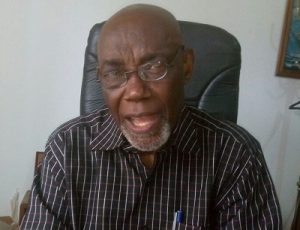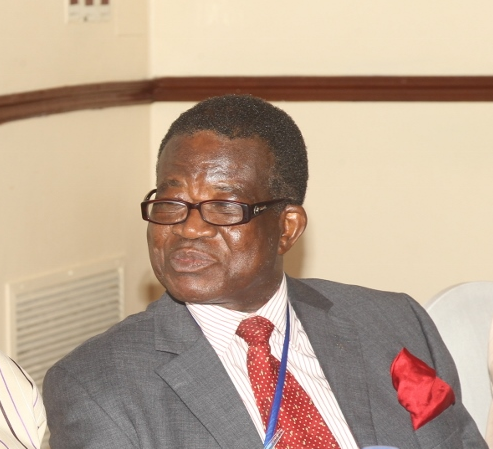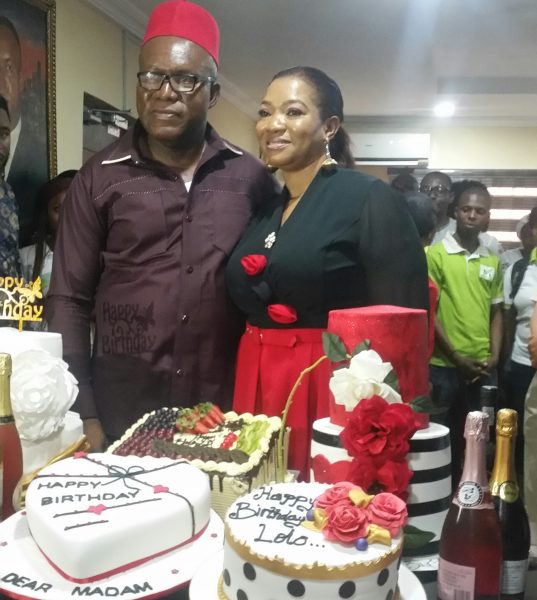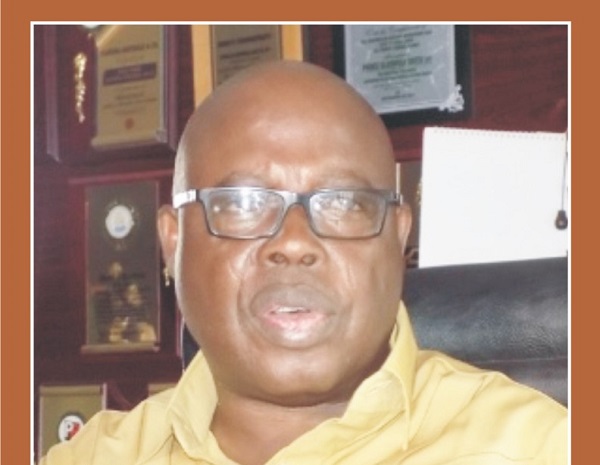Nigeria Must Learn From The Demise Of NNSL- Usoh

Dr. Kingsley Usoh is a former Chief Executive of the Nigerian Shippers’ Council. During a recent dinner and gala evening organised by the Ship-Owners Association of Nigeria(SOAN), Dr. Usoh spoke to MMS Plus on several pulsating issues affecting the nation’s transport sector, such as freight forwarding, current state of the ports, the gridlock on port access roads as well as his experience since his retirement as Shippers’ Council CEO.
Excerpts:
How has life been since your retirement as the Chief Executive Officer (CEO) of the Nigerian Shippers’ Council (NSC)?
I’m still working; I’m still studying, reading, and researching. So it’s difficult to say I’ve retired.
Sir, you may not have retired but you have moved from the public sector to the private sector. How has life been since that transition?
Business is business, whether it is owned by the government or not. The difference is that in government organizations you undergo various procedures before taking decisions while at the private firm, it is what the man at the top wants to be done that you do. You do things your own way or the way you like to do it when you are in the public sector but in the private sector, you can’t do that.
How would you compare the operations at the port while you were in the public sector to what is obtainable at the ports now?
Well, the world is changing and definitely things are changing too and if we don’t follow the changes, there will be redundancy and the economy will perish. More than 80% of trade coming into a country comes by sea, so trade means everything and if the ports is inefficient or there’s nothing coming into the ports, you call it recession which is what we are seeing now.
Are you satisfied with the current happenings at Nigerian ports?
Well the people there are doing their best, but they can do better. It all depends on what instruments we are giving them to work with and what directives are given to them. So they are obedient servants as far as I’m concerned. Those who are in the private sector will try to make sure that the people in the public sector are happy with the kind of profit they are making. So the difference is that you have to mixture of activities; some are activities from the government, the government is there to make sure that the populace are well taken care of, while the private sector are there to make profit. So you must have a way of making sure that the mixture is acceptable by all.
Looking at the ports generally, the level of activities has been at its lowest ebb since last year due to some government policies such as the rice policy and people are complaining.
No! The activities at the ports have been at low because of the state of the economy. It’s not the government. Government policy is not part of the things that makes you not to sell oil, is it? And when you sell oil you get foreign exchange and remember that this country consumes, it doesn’t manufacture because we are a consumer nation, more than 70% of what we need comes from abroad. The foreign exchange we get from oil is used to pay our bills. So, until we start to produce and have a balance trade, of those coming in and those going out.
Sir, are you justifying the fact that government banned 41 items that almost crippled the industry?
What do you mean cripple the industry? Obasanjo’s regime tried to savage us some years ago because we were owing a lot of money and some of those things we were owing were consumed and any country that cannot produce what they will export to other people apart from primary products should look again at itself and try to look at how they can get things done in a proper way. But banning doesn’t mean anything.
What do you think is the solution to this gridlock at Apapa road we are experiencing today?
I just launched a book titled, “Effective Transport Systems, a Catalyst for Nigerian Socio-Economic Development” and the answer to this problem is there, because I wrote on urban transportation as one of the chapters. It’s a technical book. It is cost 35,000 naira per copy. The answer to the question you are asking is in that book. Go and buy it and see for yourself.
Nigeria is desirous to become a maritime hub in the African continent, what do you think should be done in order to attain that status?
Purge yourselves; even some of the people who call themselves ship owners, don’t even have ships. I did a research into that, and in my research, I compared the data coming from NIMASA with the data coming from UNCTAD and you will see a difference between the tonnage. We give our own figures and what the tonnage the world says we own is different. This occurs because some people are trying to find a way to be registered as Nigerian ship owners and get the advantages because of our Cabotage laws. So why should we be doing this to ourselves? That is why I said let’s purge ourselves and be honest in the way we do our businesses.
How would you assess the activities of the freight forwarders and clearing agents? What do you think they need to do to improve in their operations?
They should go to school. I’m a fellow of the Institute of Freight Forwarders. It is not everybody who loses his job that should take himself to the ports to become a freight forwarder. Anybody who has failed or has been sacked from the civil service ends up becoming a freight forwarder.
Since a lot of people are interested in becoming a freight forwarder, we should set up a school in any of the polytechnics and start training them to learn what it is all about.
However, some Customs officers own freight forwarding companies and this is not supposed to be so. In Britain for example, I did clearing job in Britain. You don’t see the Customs man and likewise he doesn’t see you. You just put your entry, press the bell and they open their window, and you put in your entry. In fact you have your own pigeon hole and when they treat your entry, they put it back into your own pigeon hole and that’s all. Nobody needs to know anybody and that way you cannot cheat the system; if there’s a query, they give you a query. At this point, what you need to do is go and check your custom books and see what the query is all about but if that query persists and it happens three times, you will pay a penalty for the job because you have made somebody to spend extra time doing it.
So the government should come out with a policy, Customs doesn’t have to know my face. We don’t need to call a clearing agent to come and do it for us here; we can do it by ourselves. So this is where the problem is, people should learn what they are doing and find out why they are doing it and not the issue of clearing agents because there are some clearing agents that doesn’t know their left from right, they only know how to bribe Customs.
What led to the failure of the Nigerian National Shipping Line (NNSL) and should Nigeria go about the proposed national carrier?
My question is – have we found out why those things died? And if we have, what have we done to make sure that even if we get a new one, it won’t die like the first one died. This is not a matter of having the money and then throwing it in because other nations are acquiring vessels.
We must look at all the parameters to make sure that what happened in the past doesn’t repeat itself because what happened in the past was that we arranged for was 22 ships even though we got 19, have we done the requisite study on this?
It could be human! The type of vessels we ordered could also have been the problem and it could even be because of the kinds of clubs we joined as a maritime nation.
You just said that you came in from the insurance sector to the shipping sector, but your background has always been to be transport then you left from transport to school, before going insurance and then you came into shipping?
No! What happened was that after secondary school, I was working with the Nigerian Ports Authority, playing football for them because I was their goalkeeper. However, when I saw my brothers and sisters going to school, I was saying that this man will be playing football and end up becoming the last in the whole family, so I had to find something to do. So, one European, Mr. Long John then said go and do this clearing and forwarding thing; because at that time nobody studied it and in Britain the first school that brought it out was Thorough Technical College where you can do it full time for two years. So I applied and they give me admission but I didn’t go the first year because my papers weren’t ready but the second year, my papers, visas and everything was ready so I went. I completed it but while we were there the civil war started. I’ve finished with my two years course wanting to come back but we were afraid that they were killing Biafrans in Nigeria because rumours were coming and the British government was saying if the war finishes, they couldn’t allow us to stay because we had over stayed. So I had to go for Business Studies, after that, I was having these two certificates; it was as if they opened the gate for brain work. Remember I was a footballer, I just wanted something short to have certificates and continue my football career; but I started enjoying reading and tasking my brain and doing other things so I went and did a proceeding on transport and I passed. From there I applied to a university to do a postgraduate diploma in Ports and Shipping Administration, and then I applied to the Newcastle University to do Transportation Engineering and Operations, a two years course.
It was too tough because I was moving from social sciences to engineering at a master’s degree level. I was a facing tough mathematics for one year and six months. I ended up getting it and that’s why I can tell you a lot when you we are talking about port congestion, I can tell you how you can solve it because it is not only about the ports, it has other tentacles that will be affected. If you control the tentacles, you can control the ports angle. That’s why I know how to solve congestion problems of our ports in Nigeria better than anybody who read maritime economics.
I also have better experience than they have and I thank God I did it. It’s a divine choice that I did it the way I did it because that master’s degree was tough and that is why I can tell you about urban transportation, urban planning because urban planning is one of the courses you take serious if you’re doing transportation engineering. So I was able to understand more about transportation and I thank God that I was able to do what I did.
So how did you come into the Nigerian Shippers’ Council?
Well, my master’s degree thesis was written on the 40-40-20 cargo sharing of the UNCTAD Code and that is what created Nigerian Maritime Authority (NMA). It was then that then Minister of Transport, Alhaji Umaru Dikko, who had a link to my family discussed with my in-law ,who told him that since he is in transport and the brother in-law is in insurance, can they take me up? He asked what I studied. They told him and brought my thesis and showed it to him. He exclaimed immediately! He said that he had been looking for a Nigerian who read this course and asked where I had been and they told him I was working with the Nigerian Insurance Corporation and he said he wanted me to see him. The following day I went to see him with my certificates and everything, and that’s how they pulled me from there to Shippers’ Council and I was made the Deputy Chief Executive of Shippers’ Council because nobody there was a transporter.
Who was the main person there before you came?
Dr. Ekong. He was a geographer who knew little about shipping. All he knew was about the weather but as for shipping, no way. The only thing was that he worked near the deck somehow before he went abroad. But as for shipping, they said he started the shipping desk in the Central Bank of Nigeria, that’s how they looked at us. People didn’t know that shipping could be studied in the university more or less; I was the person who pushed it to how far it has gone because when I came to the Nigerian Shippers’ Council, I was the only person who had transportation qualification.
Those staffs you see there today, I trained them or I trained the persons who trained them. So I found out I was the only person and by idea, these people only knew practical so I was thinking that if I could see Nigerians who were intelligent and could do this things, I will train them. So I went to Wales University and arranged for courses for them and I also prepared with the university the course schedules and everything and I was sending people, everybody from the cleaner to the chief executives for a compulsory 4 weeks training every year, the drivers were being trained on how to manage their vehicles, repair minor things to carry them to where they are going in case there was a vehicular breakdown and they used to have spare parts in their cars.
That’s how the training program in Shippers’ Council began; it was here that I sat and read my Ph.D. So even until today, researching is part of me. If you ask them in Shippers’ Council, when I was the Chief Executive, if I caught you sleeping, you will go to your house and sleep for 2 weeks without pay but if I saw you reading newspapers or any materials, I would come and discuss with you on what you have read.
So I encouraged them to do well and if you failed GCE, you would go back and write it again and if you passed, the Council would pay you back your money because the board approved it. It’s part of the training. Some of them in Shippers’ Council have master’s degree today but when I left, they didn’t have ‘O’ levels because of the program I did. That’s why they have better manpower than any parastatal and when they see me they are so happy even to lift me up and I can say that even if you give me that job again, I’ll still do what I did because I believe that it will help grow the national economy.
Now we want to know how you were able to raise funds to build that structure?
When I took over Shippers’ Council, Shippers’ Council was worth N13,906. It was in the 1982 or 1984 audited account, so you can go and find out about it. Now, the accountant general of the federation said government did not have money and there was no way they could continue giving us subvention. So he said we should find out how to fund ourselves or be closed down.
Where was the office then?
The office was at No 8, Kanu Street, Ebutte-metta. I brought it from Ebutte-Metta, that place where beggars used to stay. We were at the beggars corner; one white man who visited the Council then, came to me one day and said and I quote “Can anything good come out from this place?” because when we went abroad we talked tough but when they came to our office we had nothing to show and you see beggars all over the places. So when I put the proposal across, I said to them; we negotiate a place for ship owners and at that time before Shippers’ Council came, we started negotiating freight with the ship owners. The ship owners used to increase freight rate every 3 to 4 months and every 1% increase in the freight rate at that time was about 980million pounds on our trades. That was what they took from our importers because of freight increases; now when we negotiated, the ship owners paid lower than what they used to collect because they charged 4%.
We reached an agreement and freight rate wasn’t increased the way they used to when they had the liberty. So I said to government, “since we are making it, we are making some savings for the ordinary shippers, that is, the importers and exporters, they should be able to pay us from that savings which is now the surplus because if we do nothing about this situation, they will spend the money and the ship owners will take it abroad.”
So, we said that government should approve it and let them pay us 1% of whatever amount and that is the 1% that Customs is collecting and at that time. I also knew that if we go to collect it ourselves, we don’t have the staff to go from every ports or borders to go and collect this money; so let us ask Customs to collect it and the money will pass through government who will in turn release it to us. Not only that, I was trying to save my head because somebody, say a frustrated staff might write a petition against me because I know that in this country, when somebody writes a petition against you, nobody will do an investigation before they will come and arrest you and then you will prove that you are not guilty. I didn’t want to go through that entire situation so I said government should collect through Customs, create an account for us and pay into that account for us to use.
Now in this case, it is what Customs collected, not that it is importer or exporter savings anywhere?
No! it was Ibrahim Babangida’s government that decided to collect 1% of import and 1% export to give us but I told them no, that we don’t have to charge the exports. Babangida’s government gave us approval that Customs should collect it so they gave us the 1% and gave raw material and research institute 1% and gave port development 5% and that is the 7% we have now and that’s how we came about the 1% given to me, they (the customs) collects and release it after 3 months. So I looked at what I learnt from insurance, you take a small premium, if you invest that small premium well, it will yield you something bigger and then you can use it to settle claims and the balance is yours and I used it for Shippers’ Council. Now, I said that what we needed was to have accounts and they way to get it is to get our own building, rent out some as long as we are not paying rent and then start setting up. In actual facts, I had 24 ways Nigerian Shippers’ Council could make income; the dry port is one, the trailer park is another and so many other things I had that we could make money from but I only implemented four before they said I should go.
But how many years did you stay at the Nigerian Shippers’ Council cumulatively?
12 years! But out of that 12, I was in command for about 8 years.
Ok. So you were the deputy until when Ekong left you then took over?
Yes! It was a struggle to turn it around because at that time, if you wrote a letter to us; we would not tear envelops because Ekong printed a lot of letter heads but there was no envelop for them. So at that time, we made sure we opened envelops carefully to remove the document. But when I took over, because government was giving us a straight line bill of 1 million every year for salaries and everything we were able to plan. Even, when some people started shouting I kept quite because if you say you are making money, they will bring all sorts of people to come and spend the money, so I was quiet. The only time they knew that we were making money was when we opened the new place (building). Everybody said this Igbo man has been there eating everybody’s money but I didn’t eat anybody’s money, I can bet you that I’m the poorest chief executive that has ever worked in a federal organization but the only thing I’m happy about is that the prayers of those I made to have their jobs, trained and everything is with me today and that is the protection I’m happy about. So I can get up and stand tall and say to anybody “go to hell”
Interesting! They have 2 percent now. The new management got the second percent, I think last year or there about.
I don’t know. So that is to help him carry out what they are trying to do and that is fantastic because if they get the right people to advise them on how to go about it, there is money for Shippers’ Council to make. Hassan hasn’t asked me because now I’m a private person but if he comes to me I’ll say “son! If you want me to advise your organization which is government, then you’ve got to make me a consultant before you can get it and I’ll advise him. But by and large, he has been wonderful”
Do you have any regret been in Shippers’ Council?
I think it’s a mission God sent to me. Because before I left this country I went for prayers and I was told that when I come back, there’s a job that is reserved and would be given to me. So when I came back, I didn’t even know what Shippers’ Council was at that time. When I was trying to come back to the country with insurance, I went for prayers again and I was told that the place I’m going to work is a stepping stone to where God wants me to be. So I came back being in insurance, believing God. Also I was in church, Church of the Lord Aladora and mother Adejobi our spiritual mother at that time said to me openly in church that what God said to me, that he said he would do it. To be frank to you, it didn’t take two months when they called me to this job. So whatever I signed with my God that I will do for the people, I was obliged spiritually to do what I did. So I have no regret and I know like I’ve said before that if given another chance to come to that seat, I will still repeat what I’ve done.
So Shippers’ Council was created out of NMA?
No! NMA wasn’t in existence. Shippers’ Council was created in the year 1978 while NMA was 1989. It was when I was in Shippers’ Council that we started talking about NMA. As a matter of fact, I was to be the first chief executive of the NMA but they said they had just given me this one that I should stick to it. I just laughed because the place didn’t have money and I wanted to escape but they said stay there. But they brought back Dr. Ekong to head NMA and Dr. Ekong out of whatever said he would deal with me at Shippers’ Council because I took over from him and I said for what? In fact, I never wrote one petition against him but I would go to him and say to him that “all these nonsense mistakes you are making, if these things enter my hand you will never get it back because I will use efficiency and effective administration to show you that I can turn this place around. When they gave him the NMA job, he was following me and he said he wanted to draw up a list of those to sack and those not to sack. He was a common enemy and I told him to concentrate there because he could lose that job if he kept following me because as far as I was concerned, my job was ordained. As you can see, I went through a lot of sacrifices to put that place the way it is today but I agreed with my God, and I don’t know if I finished what I should have done.
Actually the structure alone is magnificent and it is something people can see but your contribution to the human capacity development must have been greater than the structure.
It’s not only the structure. The present administration can also stand up and say we have the best staff in the industry and they do have the best staff because I trained them. There’s nothing like education, if you want to help a child, give him education. So that’s why you see me still writing because I’m still researching.
With all this trouble, how were you able to manage the family angle? How many children do you have?
I have only one daughter and I can’t force God to give me more than one daughter. Although she is single, I’m satisfied with her knowing that she is also one of the first class grades. My wife is a medical doctor, an eye surgeon and we live a modest life.
Where does she work now?
She was working with a finance institution but now she’s doing her own things and works with big companies in Europe. I trained her through the very best of education from American International here to the most expensive secondary schools in Britain and from there to Imperial College and back to London to do masters. They offered her a Ph.D program on Water Resources but she didn’t tell us because I would have asked her to go for it. But she said she wanted finance because her aspiration was to work for the United Nations.
So how old are you now, sir?
I am 72 years.







